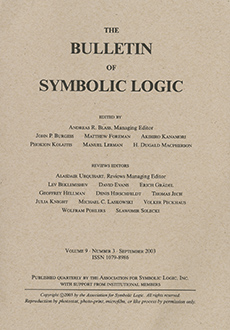Abstract
A mass problem is a set of Turing oracles. If $P$ and $Q$ are mass problems, we say that P is weakly reducible to $Q$ if every member of $Q$ Turing computes a member of $P$. We say that $P$. is strongly reducible to $Q$ if every member of $Q$ Turing computes a member of $P$ via a fixed Turing functional. The weak degrees and strong degrees are the equivalence classes of mass problems under weak and strong reducibility, respectively. We focus on the countable distributive lattices $\mathcal{P}_{\omega}$and $\mathcal{P}_{\mathcal{s}}$of weak and strong degrees of mass problems given by nonempty $\Pi_{1}^{0}$ subsets of $2^{\omega}$. Using an abstract Gödel/Rosser incompleteness property, we characterize the $\Pi_{1}^{0}$ subsets of $2^{\omega}$ whose associated mass problems are of top degree in $\mathcal{P}_{\omega}$ and $\mathcal{P}_{\mathcal{s}}$, respectively. Let R be the set of Turing oracles which are random in the sense of Martin-Löf, and let $\mathbf{r}$ be the weak degree of $R$. We show that $\mathbf{r}$ is a natural intermediate degree within $\mathcal{P}_{\omega}$. Namely, we characterize $\mathbf{r}$as the unique largest weak degree of a $\Pi_{1}^{0}$ subsets of $2^{\omega}$ of positive measure. Within $\mathcal{P}_{\omega}$ we show that $\mathbb{r}$ is meet irreducible, does not join to $\mathbb{1}$, and is incomparable with all weak degrees of nonempty thin perfect $\Pi_{1}^{0}$ subsets of $2^{\omega}$. In addition, we present other natural examples of intermediate degrees in $\mathcal{P}_{\omega}$. We relate these examples to reverse mathematics, computational complexity, and Gentzen-style proof theory.
Citation
Stephen G. Simpson. "Mass problems and randomness." Bull. Symbolic Logic 11 (1) 1 - 27, March 2005. https://doi.org/10.2178/bsl/1107959497
Information





